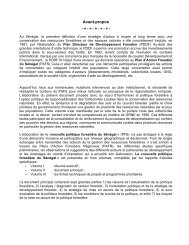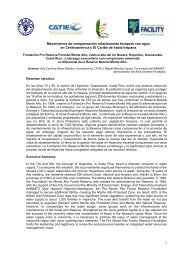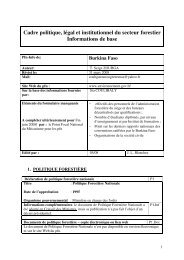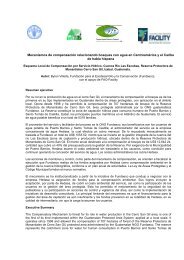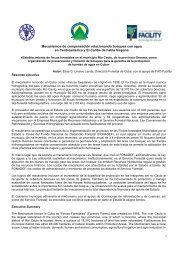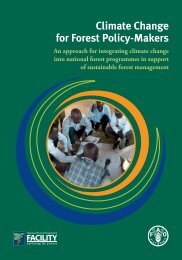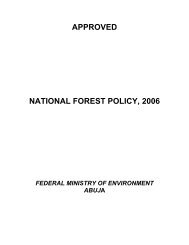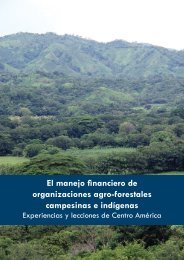<strong>2010</strong> <strong>Progress</strong> <strong>Report</strong>Table 3: <strong>Facility</strong> expenditures in <strong>2010</strong> (US$)NATIONAL FOREST PROGRAMME FACILITY <strong>2010</strong>EXPENDITURES Planned Actual/CommittedCountry Support<strong>Facility</strong> Grants-Africa 1,000,000 1,492,000 1-Asia & Pacific 450,000 388,000-Central Asia & Near East 150,000 0-Latin America & Caribbean 1,000,000 1,430,000 2Nfp’s for All (awareness/capacity)Testing and introduction of tools200,000100,000175,00050,000Policy Backstopping 900,000 636,000Total 3,650,000 4,171,000Information Services<strong>Facility</strong> Web Platform 25,000 4,000Dissemination & Learning 170,000 95,000Knowledge & Capacity Building 210,000 82,000Promotion of the <strong>Facility</strong> (UNFF, WFC, CLI) 5,000 10,000Total 410,000 201,000Programme DeliveryPersonnel 1,200,000 1,404,000Travel, GOE & Equipment 200,000 270,000OIMES 5,000 0Total 1,405,000 1,674,000TOTAL DIRECT COST 5,465,000 6,046,000Indirect Support Cost 310,000 357,000GRAND TOTAL 5,775,000 6,403,000As presented in Table 3, the overall expenditures in <strong>2010</strong> amount to 111% of the amount planned andapproved and is 1 million more than in 2009. The financial outcome for <strong>2010</strong> is commented upon in thefollowing.Country SupportSupport to countries represents 65% of total expenditures (64% in 2009). Of this, 3,5 Million US$ or 55% of thetotal expenditures (2.6 Million US$ and 48% in 2009) was provided as direct support, in the form of smallgrants to stakeholders in partner countries (Table 4). Since 2002, the direct support to countries, in the form ofsmall grants, represents 53% of total programme costs (30 million US$).The support to Africa is 50 % and to Latin America 40% above planned and Asia is almost on plan. The onlyexception to good performance is Central Asia having not received any small grants at all in <strong>2010</strong>. The totalnumber of small grants is by far the highest in Africa. The average size of the grants is also much smaller inAfrica (19,000) than in the other regions (25,000 in Asia and 31,000 in Latin America). The average grant inLatin America is almost double the amount in Africa (29,000 compared to 17,000).The total lack of small grants to Central Asia is a combined effect of slow country processes and low <strong>Facility</strong>coaching capacity. The coaching arrangements for Central Asia were thus changed at the end of <strong>2010</strong>.As for Asia, the nfp process has still not taken off in Nepal and Bhutan, and the process in Cambodia has come1 Includes US$ 95,000 for GFP Mozambique and US$ 92,000 GFP Liberia2 Includes US$ 450,000 for GFP Guatemala30
<strong>2010</strong> <strong>Progress</strong> <strong>Report</strong>to a standstill, in waiting for Government approval after the successful nfp stakeholder formulation process.Compared to 2009, the nfp process has finally taken off in Laos. The South Pacific Islands, Palau, Vanuatu andthe regional SPC are not moving mainly due to lack of coaching capacity (relying on FAO sub-regional staff). InIndonesia, the federal-level support for the nfp process is lacking as they are fully occupied with the much largerclimate related programs and projects.In total, 43 partner countries (Table 8), out of 70, received direct country support in <strong>2010</strong> (41 in 2009). As inprevious years, very few countries are spending the target of 100,000 US$ per year. Average annual countrysupport amounts to less than 70,000 US$ (not counting the GFP support to Guatemala, Liberia andMozambique).The budget for the “Nfp’s for All” initiative was almost spent as planned. The launching of second partnershipagreements was done, involving the stakeholder committees, but not in the form of capacity building workshopsas no need for this was expressed. The “Nfp’s for All” module on “Participation” was implemented in Malawi,Lesotho, Liberia, Gambia, Uganda and Zambia. In addition, a Latin American ToT event was implemented atCATIE in Costa Rica. An Asian ToT on the “Conflict Management” module was implemented at RECOFTC inThailand, and subsequent national workshops were held in China, Vietnam, Cambodia, the Philippines andThailand.The cost for Policy Backstopping in <strong>2010</strong> is on the same level as in 2009 and corresponds to 10% of the totalcosts. It is slightly lower than expected as the in-kind support from FAO, in terms of regional and sub-regionalstaff time dedicated to policy backstopping, remained at a high level in <strong>2010</strong>.31



